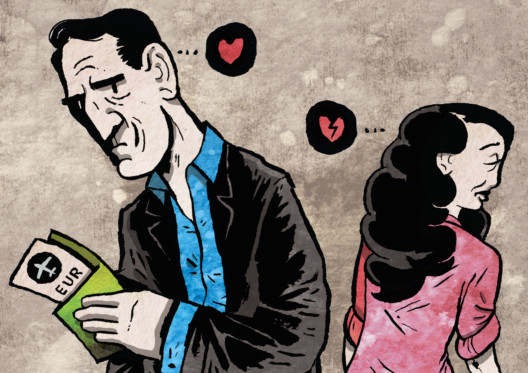
Us
By David Nicholls
Hodder & Stoughton, 416 pages, £20
When an acquaintance revealed recently that he had married a woman he met by chance on a train, I said, “Very David Nicholls”, to which he replied: “Yes, very. It wasn’t until three years after that meeting that we actually got together.”
The 47-year-old Nicholls has become one of the few authors whose name serves as conversational shorthand: in his case, for the ambushes of romance. In “One Day”, which is among the biggest-selling British novels of recent times, one-night lovers spend 20 years finding and losing each other, while in the TV two-parter “The 7:39” a male and female commuter argue on a train and almost destroy two relationships.
“Us”, for which readers and booksellers have waited with growing impatience in the five years since “One Day”, puts another couple to the test. One night, Douglas Petersen, a 54-year-old industrial biochemist, is woken by his art gallerist wife of almost a quarter of a century, Connie, and informed that she thinks their marriage may be over. This is bad news for Douglas — not only because he still loves Connie madly, but because they have recently booked an expensive grand tour of Europe as a final family holiday before Albie, their 18-year-old son, goes to college.
Luckily, continuing the way in which Nicholls’s characters often have one eye on psychological plausibility and the other on narrative possibility, Connie agrees that the trip will go ahead anyway, with an announcement of her decision on divorce delivered (like Ant & Dec opening an envelope) when they get back. Inevitably, Doug, in the manner of an electioneering politician announcing that voters have four weeks to save the NHS, treats the holiday as a campaign to sway his wife’s mind.
Whereas “One Day” mismatched a serious-minded woman with a hedonistic and libidinous man, “Us” reverses the polarities. “Connie is late for flights, whereas I like to be there the requisite two hours before departure,” notes Doug, amid a long riff on their differences, although, as he is privileged to be the book’s only narrator, we are only ever getting his view of her. He admits, in his rather priggish tone, to being “not an especially passionate man”, while Connie is a lover of culture who has done a lot of sex and drugs.
As in all Nicholls’s work, for page or screen, his organisation of the story is impeccable, the structure consisting of 180 chapters with teasing lower-cased titles such as “the glitter wars” and “pompidou paris accordion cat amazing”, which are then explained in the following section.
The narrative neatly weaves present and past with a perfect rhythmic sense of when to leave or to revisit a particular strand. The dialogue is always bouncy (even costive Doug is given some spicy one-liners) and there are some nice, Brysonish summaries of the towns and hotels the Petersens visit on their break.
And, although assumed to be a sentimental populist by those who have read about his success rather than reading his books, Nicholls is far more willing than the romcom film director Richard Curtis (to whom he is often compared) to challenge the genre’s expectation of a happy ending. “Us” follows “One Day”, which was ultimately a sort of rom-trag, in admitting scenes and sentiments of unsettling bleakness.
His previous novel established Nicholls as a fiction writer of unusual popular appeal; he unexpectedly threatened to get through a heavily policed literary border control this summer when “Us” was longlisted for the 2014 Man Booker Prize. It failed to make the shortlist, which feels like the right decision: while the new book deserves to match the sales of “One Day”, it doesn’t make a case for the author joining the highest literary ranks.
What holds Nicholls back may be a fear of offending his wide readership. The books are acute and astute about the dynamics of relationships, noting in “Us”, for example, that when two people are trying to restore a damaged marriage, “pretending that nothing has changed is a change in itself”. But, in stories that turn on sex and death, Nicholls is oddly puritanical about physical detail. The writer’s work as a screenwriter is controlled by TV watersheds and cinematic age-certificates; it often feels as if he is also censoring his fiction. After a highly significant bedroom encounter, the narrator warns, “I won’t go into the details”, and also declines to describe a terrible event in his life on the grounds that “some things cannot be lived through twice”.
Perhaps a man so decorous and private should not have been given hundreds of pages to tell his story. The sex scenes here have different contexts — seductive, conceptive, post-infidelity, pre-break-up — and it is frustrating to have all these encounters categorised as “fine”. “Us” is very David Nicholls, but with the next novel he might usefully let himself go a bit more.
–Guardian News & Media Ltd
Mark Lawson’s “The Deaths” is published by Picador.









